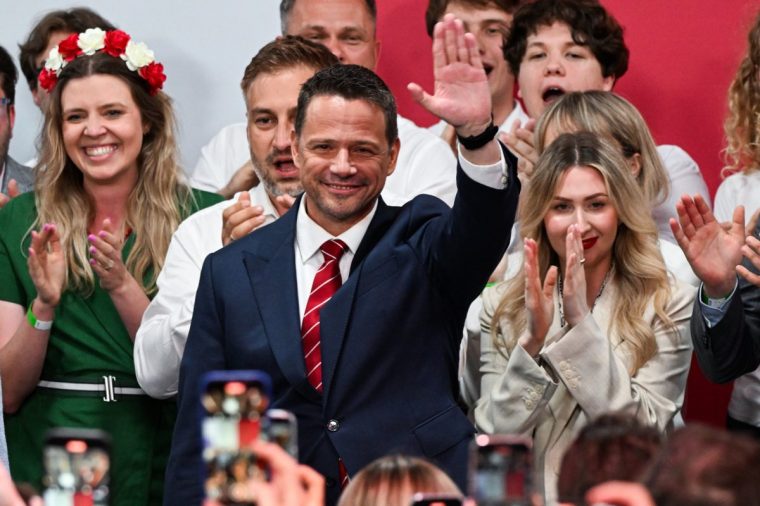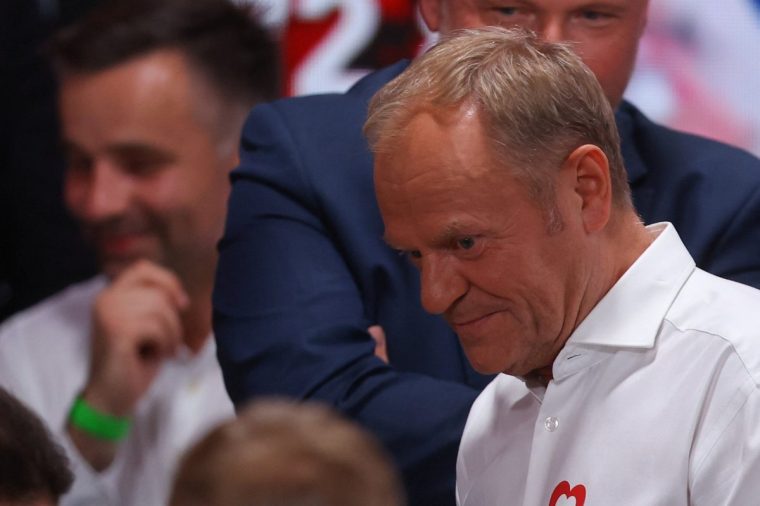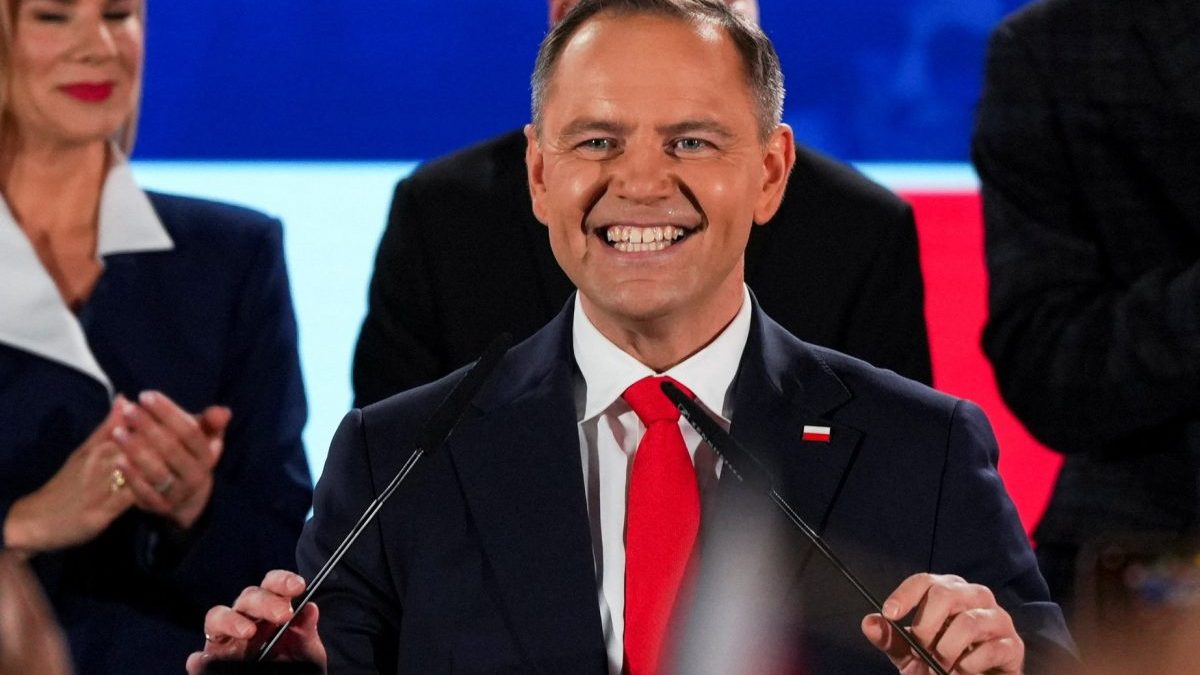Nawrocki win bucks international trend of hard-right populists losing after aligning with Trump
It was a razor-thin win, 50.9 per cent of the vote to 49.1 per cent.
But the conservative nationalist Karol Nawrocki’s victory in Poland’s presidential runoff election on Sunday is a huge blow to Poland’s pro-European trajectory – and to the ability of Prime Minister Donald Tusk’s centrist coalition to govern at all.
Nawrocki, 42, is a historian backed by the hardline conservative Law and Justice (PiS) party. He is also an amateur boxer and avowed former football hooligan, and has never held elected office.
His campaign, steeped in Catholic nationalism and anti-EU rhetoric, promised to halt Tusk’s reform agenda and “restore sovereignty” from the perceived overreach of Berlin and Brussels. Tusk, Nawrocki said, has “a monopoly of evil power.”
His triumph, over the pro-European liberal Rafał Trzaskowski, promises institutional paralysis. Under Poland’s constitution, the president can veto legislation, which can only be overridden with a three-fifths majority in the parliament, the Sejm. Tusk’s coalition, which came into office after the 2023 parliamentary elections, falls well short of that threshold.
 Nawrocki, his wife Marta and family greet supporters as exit polls were announced on tv (Photo: Wojtek Radwanski/AFP)
Nawrocki, his wife Marta and family greet supporters as exit polls were announced on tv (Photo: Wojtek Radwanski/AFP)
On Monday evening, Tusk vowed to call a confidence vote following Nawrocki’s victory, and insisted that the presidential elections “have not changed and will change nothing”.
Given the parliamentary arithmetic, Tusk is likely to survive. But for a government already struggling to deliver on campaign promises – including restoring judicial independence, liberalising abortion laws, and shifting toward green energy – Nawrocki’s win all but guarantees gridlock.
Since taking office in 2023, Tusk has attempted to undo PiS’s packing of courts and independent institutions with its cronies, but he has been stymied by the outgoing president, Andrzej Duda, who is also backed by PiS.
Nawrocki is expected to be even more combative. “I expect President Nawrocki to be even less cooperative than Duda,” said Jakub Jaraczewski, a research Coordinator at Democracy Reporting International.
“A comprehensive restoration of judicial independence is now vanishing from the table. Tough times ahead.”
Many see Nawrocki’s rise as the PiS party’s renewal in a more extreme form, echoing the style of Donald Trump’s second term. Indeed, last week, US Secretary of Homeland Security Kristi Noem flew to Poland to endorse Nawrocki, calling him a “strong” leader like Trump.
It comes despite a series of elections – in Canada, Australia and Romania – in which the hard-right populist candidates saw their prospect damaged by their proximity to the US president.
This time, the Trump effect may have been marginal. Nor did Nawrocki appear to have been affected by a series of scandals: ties with criminals (which he describes as “strictly professional” in his role as a historian); revelations that he once dressed up as someone else to promote his own book (to which he retorted that “literary pseudonyms are nothing new in Polish academia”); and allegedly procuring sex workers for guests at a hotel where he worked (he denies the claims).
The main reason for his victory seems disaffection with Tusk’s government.
 Trzaskowski appeared positive earlier in the evening – but his pro-Brussels platform was narrowly rejected (Photo Omar Marques/Getty Images)
Trzaskowski appeared positive earlier in the evening – but his pro-Brussels platform was narrowly rejected (Photo Omar Marques/Getty Images)
Like Trump, Nawrocki believes in absolute sovereignty, and is loathe to accept any instruction from supranational authorities – and part of his appeal appears to be his Trumpian rants against supposedly meddling outsiders.
The election will cripple Tusk’s efforts to bring Poland back into the European mainstream after a decade of drift. Billions in EU recovery and cohesion funds – released on the condition of judicial reform – now hang in the balance.
If those changes are vetoed, as Nawrocki has pledged, Brussels may once again freeze Poland’s funding.
This political stalemate could also catalyse a broader crisis. With Nawrocki emboldened, opposition MPs are expected to target the weakest links in Tusk’s diverse coalition – a blend of liberals, conservatives, and agrarians – as potential defectors. Should the coalition splinter, early elections could ensue.
 Tusk now faces an uphill battle, as anti-EU forces are emboldened (Photo: Kacper Pempel/Reuters)
Tusk now faces an uphill battle, as anti-EU forces are emboldened (Photo: Kacper Pempel/Reuters)
And with Tusk’s government already losing popularity over its failure to deliver reforms, polls suggest PiS could return to power – potentially in alliance with the far-right Confederation party, which is ascendant among younger voters.
Beyond domestic deadlock, Nawrocki’s win signals a shift in Poland’s international posture. His rhetoric – warning against Poland becoming a “province of a federalising EU” – has drawn praise from fellow nationalists like Hungary’s Viktor Orbán and France’s Marine Le Pen.
He opposes the EU Green Deal, criticises migration policy, and flirts with abandoning Poland’s longstanding pro-Ukraine stance by rejecting Kyiv’s NATO membership. Poland’s post-2023 renaissance as a reliable EU pillar and NATO ally now looks at risk.
Markets have noticed. The Polish stock market dipped following Nawrocki’s victory. The zloty weakened. Investors, who had returned with enthusiasm after Tusk’s 2023 win, are again uneasy.
Nawrocki’s win promises a weakened, paralysed government, a chill in EU-Polish relations, a boost for far-right populism in Europe; and a battered reputation for a country that, only two years ago, looked poised to lead the EU’s eastern renewal.
